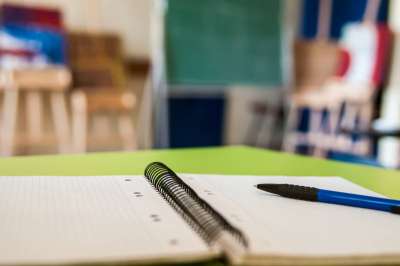From "ability groupings" to "wait time," we've got you covered!
If you are confused about all the different education terms you’ve come across while preparing for a teaching job, this glossary of education jargon will help you understand common terms of the profession.Educational Jargon: The A to Z
Welcome to our comprehensive dictionary of educational jargon. This resource is designed to help you navigate the complex terminologies, acronyms, and phrases that are prevalent in the world of education.
Whether you're an aspiring teacher, a seasoned educator, or a curious parent, understanding educational jargon is crucial for effective communication and collaboration in the educational field. Read on to demystify the language of education.
What is educational jargon?
Educational jargon refers to the specialized language, terms, acronyms, and phrases used in the field of education. This can include terminology related to teaching methods, assessment types, educational policies, and academic theories.
While it can be confusing for those new to the field, understanding this jargon is crucial for effective communication and collaboration within the education sector.

Dictionary of educational jargon
A
ability grouping Placing students into groups based solely on their achievement on a test.
academic standards Statements that provide a clear description of the knowledge and skills students should be developing through instruction.
accommodation A device, material, or support process that will enable a student to accomplish a task more efficiently.
ADHD Attention-deficit/hyperactivity disorder. This is a condition in which an individual has difficulty sustaining attention, focusing on information, and frequently demonstrates hyperactive behavior.
analysis A level of questioning in which students break down something into its component parts.
anecdotal records Narrative descriptions of student behavior or performance.
anticipation guide A teaching strategy that encourages students to use their background knowledge about a topic before reading about that topic.
application A level of questioning in which students take information and apply it to a new situation.
assessment Gathering information about the level of performance of individual students.
attitudinal assessment Determining the attitudinal or emotional growth of your students.
Bbenchmarks See performance standards.
bilingual An individual's ability to speak his or her native language as well as an additional language fluently.
block scheduling Longer academic periods (primarily at the high school level) that allow students to pursue a subject in more depth. Periods may range from 70 to 140 minutes in length.
bodily-kinesthetic intelligence This intelligence focuses on physical activities; eye/hand coordination; and the ability to move around through dance, plays, or role-playing activities.
brainstorming Generating lots of ideas from many individuals.
buzz session A temporary group of students formed to discuss a specific topic.
CCD-ROM A computer disc of digitized sounds, activities, and/or pictures.
charter school A school operated as a for-profit enterprise.
closure The final instructional activity in a lesson plan.
comprehension The way in which ideas are organized into categories.
constructivism The way knowledge is created in the mind of a learner.
content courses Teacher preparation courses that focus on the specific content of factual information about a subject (chemistry, social studies, algebra). College students in secondary teacher education programs most often take these courses.
cooperative learning Placing students into small groups and having them work together toward a common goal.
copyright The registration with the Library of Congress that protects a book or other printed material from unfair and/or unauthorized duplication.
creative thinking Generating new ways of looking at a situation.
criterion check A point in any lesson at which the teacher stops and checks to see if students understand the material up to that point.
critical thinking The ability to analyze information.
Ddeductive thinking Going from the general to the specific. See also inductive thinking.
dehydration A reduction of water content.
differentiated instruction Providing instruction according to the different ability levels in a classroom.
dimensions of learning The five basic elements of any teaching/learning situation: confidence and independence, knowledge and understanding, skills and strategies, use of prior and emerging experience, and critical reflection.
disruptive behavior Any behavior that interferes with or impedes a teacher's ability to teach and students' abilities to learn.
Eeducational technology Any instructional aid or media teachers use to support the teaching and learning process.
elaboration The expansion of an idea or thought.
elementary teachers Teachers who teach preschool up through grade 6.
evaluation A method of determining if students learned what they were taught. It is usually conducted at the end of a lesson.
extrinsic motivation When an individual is motivated by outside factors or other people (as opposed to being motivated from within).
Fflexibility The skill of drawing relationships between seemingly unrelated ideas (How are a brick and a book similar?).
fluency The ability to create a lot of ideas.
formative evaluation Evaluation that takes place between the introduction of material and its conclusion.
free lunch A student's meal which is completely subsidized by government funds.
Ggifted students Students who demonstrate high levels of imagination, curiosity, and intelligence.
graphic organizer A chart, outline, or web of ideas or concepts visually organized into groups or categories.
Hheterogeneous groups Groups of students of mixed abilities.
high-stakes testing When students take standardized tests, the results of which are rewarded in some way (graduation, for example).
homeroom The classroom a secondary student attends in the morning (or at the end of the day). Attendance is taken, announcements are made, and forms are completed in this room.
hypothesis An assumption, interpretation, or guess based on currently available information.
IIDEA Individuals with Disabilities Education Act. This is the name given in 1990 to what was formerly known as Public Law 94-142 (the Education for All Handicapped Children Act).
IEP A document that outlines specific learning objectives for a student and how those objectives will be carried out.
inclusion Involving all students in the educational setting that best meets their needs.
inductive thinking Going from the specific to the general. See also deductive thinking.
in-service teacher An individual who has been hired by a district and is actively teaching.
INTASC The Interstate New Teacher Assessment and Support Consortium. This a group of state education agencies and national educational organizations who work to reform the preparation, licensing, and professional development of teachers.
intelligence The ability to use knowledge.
intermediate teachers Teachers who teach forth, fifth, and sixth grade.
interpersonal intelligence The ability to work effectively with other people.
intrapersonal intelligence The ability to understand one's own emotions, goals, and intentions.
intrinsic motivation Motivation that comes from within the individual.
JJigsaw: A cooperative learning strategy that enables each student of a "home" group to specialize in one aspect of a topic (for example, one group studies habitats of rainforest animals, another group studies threats to animal survival; etc.). Students meet with members from other groups who are assigned the same aspect, and after mastering the material, return to the "home" group and teach the material to their group members.
Kknowledge The facts and data of a subject.
Llaws of learning Basic laws or rules by and through which learning occurs.
learning center A self-contained section of the classroom in which students engage in independent activities.
learning disabled students Those students who demonstrate a significant discrepancy between academic achievement and intellectual abilities in one or more areas.
lecture Sharing information with students verbally.
lesson plan An outline of goals and objectives, activities designed to help students achieve those goals, and objectives and ways to assess whether students have actually reached those goals and objectives.
listserv A list of e-mail addresses maintained by a group or organization. E-mail can be sent electronically to everyone on the list by any member of the list.
locus of control The degree to which individuals perceive they are in control. There are two types: external (people motivated by others) and internal (people motivated from within).
logical-mathematical intelligence The ability to reason deductively or inductively and to recognize and manipulate abstract patterns and relationships.
Mmagnet school A school that specializes in a specific subject area.
manipulatives Physical materials such as cubes, blocks, or balls that model mathematical concepts.
memory The way we recall previously learned or previously experienced information.
mental imagery Creating pictures or images in one's own mind.
mentor An experienced teacher who assists a new colleague.
methodology The way(s) in which information is shared with students.
methods courses Teacher preparation courses that focus on the methods, ways, procedures, or strategies of teaching (the “how-to's” of teaching).
modification Changes in the instruction, course content, or outcomes for special needs students.
motivation An emotion or psychological need that incites a person to do something.
motivational opening An initial activity or motivational devise in a lesson designed to get students' attention or tap into their background knowledge.
MP3 Moving Picture Experts Group Audio Layer 3. This is an audio compression technology that provides high-quality sound in a very limited space.
multimedia A combination of technologies to create an instructional program or experience for students.
multiple intelligences A theory that postulates that human beings have eight separate intelligences (rather than a single IQ score) that determine how they learn.
musical-rhythmic intelligence Sensitivity to the pitch, timbre, and rhythm of sounds and the elements of music.
I=Nnaturalistic intelligence The ability of individuals to recognize plants and animal lives and to have an appreciation for nature.
neural forest The connections that occur between brain cells. The more connections, the thicker the neural forest; the thicker the neural forest, the more we know about a specific topic.
neuron A brain cell.
Oobjective A statement that describes what students will be able to do upon completion of an instructional experience.
originality The creation of singular and unique ideas.
Pparaprofessional An individual (usually uncertified) who works with a teacher in a classroom setting.
parent-teacher conference A face-to-face meeting between a teacher and one or both parents (or guardians) of a student to discuss the student's academic performance and any concerns either party might have.
performance The ability to effectively use new information in a productive manner.
performance assessment When students demonstrate their mastery of material through a “hands-on activity” (assembling an electrical circuit, for example).
performance standards Statements that describe what it will take for a student to demonstrate mastery of a standard.
phonemic awareness A recognition that spoken words are composed of several individual sounds.
phonics A recognition of sound-spelling relationships in printed words.
planning time Time during the day when a teacher does not have students and can plan lessons and other activities.
portfolio assessment A collection of materials designed to demonstrate progress over time.
praise Verbal comments that recognize individual students.
prediction An educated guess about something that may happen in the future.
prior knowledge The knowledge a learner already has about a topic or subject. It is the past knowledge a learner brings to a new learning situation.
probing A series of teacher statements or questions that encourage students to elaborate on their answers to previous questions.
problem-solving The ability to identify and solve problems by applying appropriate skills systematically.
process evaluation The way students go about learning. It may or may not be related to what they learned.
product evaluation A formal test that occurs at the end of a lesson or lessons.
project assessment When students design a project that illustrates a specific principle (science fair projects, for example).
prompting Assisting students in thinking beyond their response to a question.
Q Rrealia Three-dimensional objects used for instruction.
reduced lunch A meal that is partially subsidized by government funds.
remediation A teacher comment that helps students reach a more accurate or higher-level response.
round robin A small group setting in which each student shares information.
routines Ways of managing the classroom; an established set of expectations.
rubric A document that describes varying levels of performance (from high to low) for a specific assignment.
rule of two-thirds In a traditional classroom, 23 of class time is taken up by talking, 23 of that time is taken up by teacher talk, and 23 of the teacher talk is telling or disciplining.
Ssearch engine A computer program designed to find websites based on keywords you enter.
second language learners Students whose primary language is not English. They are learning English as their second language.
secondary teachers Those teachers who teach in grades 7 through 12 (in most states).
section 504 A civil rights law that requires that institutions not discriminate against people with disabilities.
simulation An activity in which students are given real-life problem-solving situations. The emphasis is on student decision-making.
specials Classes usually designated as nonacademic. They typically include art class, P.E., library time, and music class.
standards A description of what students should know or be able to do.
standards-based teaching When teachers use activities and lessons to ensure that students master a predetermined set of requirements or standards.
stimulus An event that causes something else to happen or take place.
stress What people experience when a situation challenges their ability to effectively cope.
stressor An event, circumstance, or situation that causes stress.
summative evaluation Evaluation that occurs at the end of a unit of study.
synapse The place where electrical and chemical connections are made between one brain cell and another.
synthesis The combination of knowledge elements that form a new whole.
systems analysis Analyzing the parts of a system and the manner in which they interact.
Ttask orientation The degree to which a teacher provides learning opportunities (as opposed to dealing with management issues) for students.
taxonomy An orderly classification of items according to various levels (low to high, small to large).
teacher burnout The time in a teacher's life when the demands and expectations of the job exceed one's perceived ability to accomplish them.
teacher's guide A supplement to a textbook which includes a collection of teaching materials, lessons, ideas, and activities to help you teach the subject.
textbook A collection of the knowledge, concepts, and principles of a selected topic or course.
U Vverbal-linguistic intelligence The ability to use and produce language effectively.
visual-spatial intelligence The ability to create visual images in the form of drawings, designs, maps, puzzles, mazes, and other creative items.
Wwait time The time between the asking of a question and the solicitation of a response.
X Y ZZone of Proximal Development (ZPD): The difference between what a learner can do without help and what they can achieve with guidance and encouragement from a skilled partner.
Zero Tolerance Policy: A policy that enforces strict consequences for certain behaviors or rule violations, usually without regard to the circumstances or disciplinary history.














